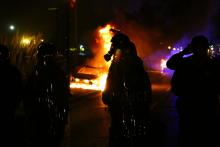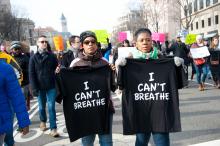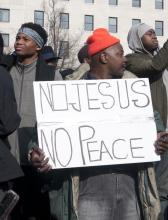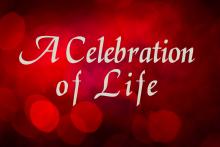police brutality




We don’t know what prompted Rev. Franklin Graham to log onto Facebook and pound out the words that lit a firestorm last week. But within one day, tens of thousands of his faithful followers liked and shared his short, patronizing post that called “Blacks, Whites, Latinos, and everybody else” to “Listen up” and tune in to his take on why so many black people have died at the hands of police officers recently. According to Graham, the problem is “simple.” It can be reduced to their lack of obedience and bad parenting.
By Monday morning, more than 80,000 people shared the post and almost 200,000 liked it. Sojourners’ Jim Wallis penned a strong response.
On Friday an evangelical pastor based in Oakland, Calif. (the birthplace of the Black Lives Matter movement), Dominique Gilliard, shared the post with a small diverse group of evangelical leaders who decided to craft a collective response. This open letter was crafted by the collective efforts of Rev. Leroy Barber (CCDA and Word Made Flesh), Gilliard (New Hope Oakland), Dr. Brian Bantum (Seattle Pacific University), Micky ScottBey Jones (Transform Network), Efrem Smith (World Impact) and me (Sojourners). We didn’t know if our words would resonate. We only knew the truth that we must speak in response to Graham’s outsized influence coupled with apparent ignorance. In the end, a broad representation of national evangelical leaders agreed to sign this letter to Graham as principal signatories.
We invite you to read it, discuss it in your churches, and add your name to the many who say “No more!” We will not tolerate this type of flippant, patronizing commentary from faith leaders on critical issues that mean life and death for many in the body of Christ and in communities across America. We won’t tolerate it, even one more day. Rather, we invite all with open hearts to enter into dialogue — and to join us in the ministry of the gospel — the ministry of reconciliation.


“Some of those protestors were right,” said Attorney General Eric Holder, as he released the Justice Department’s report on the police department in Ferguson, Mo. The report should be read by anyone who believes in racial justice and reconciliation, because it shows us what we are still up against in 2015, 50 years after the Selma march. This is not a post-racial America, especially in regard to our policing and criminal justice systems. Ferguson has become a teaching parable for the nation.
After a detailed and thorough investigation over many months, the devastating report revealed a police force and court system in Ferguson that proves true virtually everything young protestors and local residents have been saying since the shooting of Michael Brown last August.
The Ferguson Police Department replaced its mission of public protection with revenue generation by extracting money from the black residents of their town, using methods that the Justice Department said “may be unlawful.” The report painfully and painstakingly reveals unconstitutional and consistently abusive policing aimed at balancing the city budget on the backs of its poorest and black citizens. The Ferguson police went beyond even racial profiling to direct racist exploitation for a profit, with police apparently more concerned about “ fill[ing] the revenue pipeline” than protecting public safety. The use of traffic stops, citations, court appearances, fines, and even arrests that were specifically targeted at black residents revealed a profound contempt for black people with racial slurs and abuse a daily occurrence. Disgusting racist jokes, even aimed at the president and the first lady, circulated in e-mails from police supervisors and court officials. One joked about a black mother getting a crime prevention award for having an abortion.



National Guard Sgt. Valerie Deant found mugshots of black men, including one of her brother, riddled with bullet holes at a police range in south Florida last month. After outraged critics drew attention to the police department, clergy across the country began to post photos of their own faces with the hashtag #UseMeInstead. The Washington Post explains why the hashtag began:
The effort was “motivated by our service to Christ and his call to love our neighbors,” Gonnerman told The Post.
“We initially started thinking if a whole lot of us, in our clergy collar and worship attire, sent our photos to them, it would make a really powerful statement,” Rev. Kris Totzke, a pastor in Texas, told The Post. “Then, it really snowballed, and we got people all over the country and of all different faiths.” …
“It’s such a desensitization thing, that if you start aiming at young black men, and told to put a bullet in them, you become desensitized,” Gonnerman said. “Maybe, to change the picture, it’s you know what, dare ya, shoot a clergy person.”



Maybe I am the only one wondering “What can I do?” as I watch and read the news of demonstrations throughout the country. I have a lot of excuses. I can’t go to the protests tonight because my son has a concert. I don’t coordinate the church service and announcements, so I can’t control what will and won’t be said. I’m on sabbatical so I won’t be a part of the conversations that I hope will happen between colleagues at meetings. But I hope I am not the only one wondering what can be, needs to be, ought to be done.
The videos are chilling – Eric Garner’s life is being choked out of him until he goes limp on the sidewalk and Tamir Rice is being gunned down, the police squad door barely opening as the officer drives by. The images of protests and protesters being tear gassed and throwing canisters back at police armed in riot gear remind me of the summer I spent in Korea, marching in protests against U.S. military presence. That was the summer I learned about wearing damp handkerchiefs near my eyes and over my nose to help with the sting of tear gas and how to wet the wick of a homemade Molotov cocktail before lighting and lobbing. A few years later in a hotel room in Indiana after a job interview, I watched protests and riots take over Los Angeles. Living with, wrestling with injustice day in and day out is a bit like a kettle of water just about to hit boiling. At some point, the water boils, the steam is released.




“Excuse my ignorance, I thought I was a free black man.”
“I’m 11 [years old], I matter.”
“You can choose to look away, but never again can you say you didn’t know.”
“How many times do we have to protest the same [s**t]?”
“White silence is white violence.”
“We have nothing to lose but our chains.”
These signs, and many others, lined the horizon of Pennsylvania Avenue on Saturday in Washington, D.C. In a ‘Justice for All’ march organized by Al Sharpton and the National Action Network, thousands of protesters gathered to protest police actions that have resulted in the deaths of unarmed young black men across the United States.
After marching from Freedom Plaza to the U.S. Capitol, protesters listened to speakers from national racial justice organizations address some of these most recent acts of police brutality.
Al Sharpton sought to draw attention to the diversity present on the streets.
“This is not a black march or a white march. This is an American march for American rights,” he said.
Indeed, the black community was not alone in speaking up against police brutality. One Latina activist encouraged her Latino brothers and sisters to “voice their pain” from police harassment and “come forth and unify with the African American community so we can be strong together.”
“¡Ya Basta!” she concluded. [“Enough is enough!”]



For the past several years, I have been less outwardly celebratory during the Christmas season. No wreaths, trees, or bad sweaters for me; I have chosen to be introspective during the end of the year season in order to keep my focus on the true meaning of Christmas. This has become increasingly difficult, as the process of commercializing the celebration of Christ’s birth begins right after Halloween and extends itself until after the nation celebrates the life of Dr. King in January. This year, it has been increasingly difficult to concentrate on this Season of Advent in light of all of the anger and protests going on around the country. The protests over grand jury decisions in both the Michael Brown (Missouri) and Eric Garner (New York) cases and the heartbreak and anger over the deaths of Tamir Rice (Ohio) and Akai Gurley (also in New York) have served for me as a reminder that we need to rally around life.
Many of those critical of the decisions in these cases say that black lives do not matter, and there is some validity to that in a nation that has never truly been delivered and healed from the effects of chattel slavery. Those on the other side say that these cases have gone to the judicial system and that the system should be respected, the issue dropped, and that personal responsibility is the mindset that will move the nation forward. While there is truth in both of those opinions, I am led to think of the joy the families of these dead men and boys must have felt at their birth – a moment of endless possibilities – and I also think of the finality – the end of chances represented by their deaths.